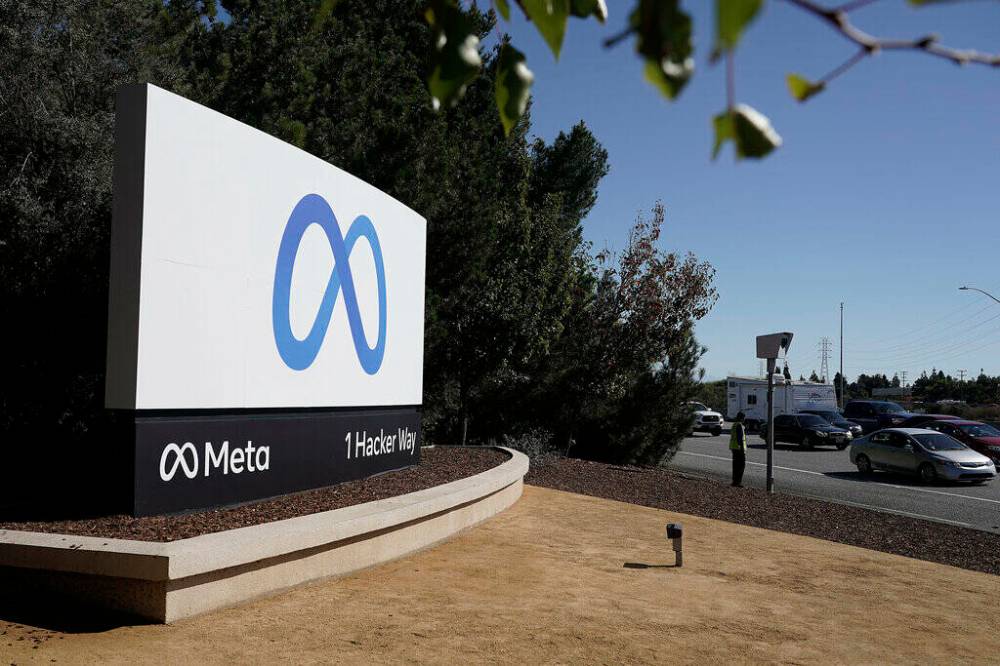
Digital entrepreneur Mark Zuckerberg is the entitled youngster who dwells in the parental basement — and stubbornly refuses to pay rent.
And, no, Zuckerberg doesn’t do the dishes either. And that young punk drank your best single malt whisky and failed to replace it. He didn’t even have the courtesy to water it down to hide his theft.
It’s official. The tech billionaire and his self-referential company, Meta, will ban news posts before they’ll pay one cent of royalties to Canadian news outlets.
Tony Avelar / AP Files Facebook serves a heaping helping to themselves.
Bill C-18, the Online News Act, is the source of the dispute between Facebook co-founder Mark Zuckerberg and the federal government.
It’s too little too late for old school media-types. Where were you, Bill C-18, when my biggest clients, Canadian magazines and newspapers, slashed their freelance budgets and cut staff because longtime advertisers redirected their dollars towards social media?
It’s not like the feds weren’t lobbied, repeatedly, to enact some type of legislation to protect news outlets from this blatant copyright violation.
Oh, no, the snail-paced feds can’t legislate something as ubiquitous as the slippery Internet. It’s ungovernable — like a trucker convoy showing up in Ottawa with bouncy castles and portable hot tubs.
If only Canadian journalists had more hubris — and less pride — we’d have marched on Ottawa.
But we didn’t and we grumbled about the unfairness on social media instead. So here we are almost 20 years since the 2004 launch of American-made Facebook. Sedentary Canadian legislators are finally lacing up their skates while concussed creators continue to play hurt.
It’s not like I don’t receive any royalties. Every year, Access Copyright stuffs my pre-Christmas stocking with $2 bills like my devoted Grandma Brough in Winnipeg once did. But it’s not enough.
In 2021, my alma mater, York University in Toronto, won a protracted royalty dispute with Access Copyright. York isn’t required to pay mandatory copyright for use and reproduction of authors’ materials.
Like Meta, the well-heeled higher educators hypocritically balked at the prospect of paying the talent for the use of their work. After all, don’t most writers write for the love of it so the president and board of York University can keep their cushy perks coming?
Can you imagine not paying your dentist for pulling a tooth? If you’re a Canadian freelance writer, you might as well tie a string to a door and pull your own.
Twice a year, I fork out $300 for teeth-cleaning and a checkup. The friendly receptionist always asks the same question: “Are you on a plan?” And I reply: “I’m a freelance writer.” And then I pull out my debit card. The delay of Bill C-18 is why I have an overdraft for such contingencies.
It’s hard not to get embittered when you see the deck so clearly stacked against you. Meta is one reason why beleaguered print media outlets still pay me 1970s freelance rates.
How can Canadian print and online media afford to pay a decent freelance fee (or employee salaries) when Zuckerberg steals your expensive-to-produce content without consequence?
Because Meta is the superhighway of media. Canadian newspapers are like dusty old shoe stores located in forlorn towns that were bypassed when newfangled interstates replaced Route 66 in the 1950s.
But it didn’t have to be that way. Canadian legislators chose to let the free market dictate digital policy. Just like they did with the housing portfolio.
Meta is not the only culprit. Just ask musicians about Spotify. Working musicians must constantly tour because they can’t count on revenue from their recorded music when Spotify pays only a fraction of a cent per play for each song.
It’s not like the feds did nothing to prop up the faltering Fifth Estate. In 2022, the federal Local Journalism Initiative was launched.
Its lofty aim is to support “underserved” markets so community papers can continue to pound out more mediocre, typo-riddled drivel, which appears right next to the local bowling scores, 60th wedding anniversary coverage and obituaries.
These low circulation papers, and their overworked/underpaid staff, typically don’t have the depth on the bench to critique the federal government’s record. It’s win-win.
Only time will tell how Meta’s counter-move to Bill C-18 will land. Pundits speculate that mainstream news feeds will be replaced with more fake news and conspiracy theories on Meta’s Facebook and Instagram platforms.
“War is peace. Freedom is slavery. Ignorance is strength,” George Orwell once wrote in his prescient novel, 1984. And Meta’s self-referential looking glass, paid for by our eyeballs, will have to soldier on, valiantly, without the benefit of free Canadian news content.
Patricia Dawn Robertson’s father, John Robertson, started his journalism career in 1956 at the Winnipeg Free Press and earned $50/week as a copy boy. Patricia’s memoir, Media Brat, will be available this fall.


